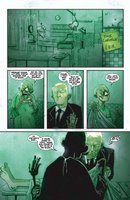 1. Fell (Warren Ellis/Ben Templesmith, Image)
1. Fell (Warren Ellis/Ben Templesmith, Image)There was a time when I was worried that Warren Ellis's best work was behind him, as it had been years since he'd done anything as good as Transmetropolitan, The Authority or the early issues of Planetary. His string of self-contained mini-series for various publishers has been hit and miss, and his mainstream superhero work is weak. But Ellis was back in a big way this year, and this is his best work in a very long time. Considering that he's often credited/blamed for introducing decompression into mainstream comics, it's impressive that this series packs twice as much content as the average comic into only 16 story pages. It's incredibly disciplined craftsmanship, a great collaboration between Ellis and artist Ben Templesmith. The structure serves the story well. It stars your typical cynical Ellis protagonist but takes place in a fully realized surreal city, with great supporting characters and a sense of otherworldliness and menace that's greatly enhanced by the art. It's only three issues in, but I think Fell has the chance to become one of Ellis's greatest achievements.
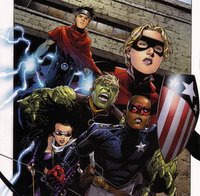 2. Young Avengers (Allan Heinberg/Jim Cheung & various, Marvel)
2. Young Avengers (Allan Heinberg/Jim Cheung & various, Marvel)This is a book that nearly everyone online thought would be a bad idea, and turned out to be Marvel's best launch since Runaways. Maybe it's thanks to his experience writing for The O.C., maybe it's thanks to his obvious love of Marvel continuity, and maybe it's just luck, but whatever it is, Allan Heinberg has a real knack for writing snappy dialogue, engaging characters and plots that weave the new in with the established. I've never been an Avengers fan and I'm not reading Brian Bendis's take on them now, but I still love this book and the way it takes advantage of the rich tapestry of the Marvel universe while doing what very few mainstream superhero comics do anymore - exploring new characters. Yes, there have been occasional problems with lateness, but the fill-in artists have generally done well, and the book's momentum hasn't really been hurt. This is one of the only comics that gets me excited (rather than annoyed) about interlocking, continuity-driven superhero universes, and makes me believe in their potential to inspire great storytelling.
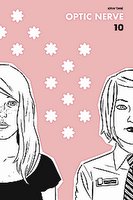 3. Optic Nerve (Adrian Tomine, Drawn & Quarterly)
3. Optic Nerve (Adrian Tomine, Drawn & Quarterly)I don't remember where I first read Adrian Tomine's work, but I've been captivated for a long time by his simple, almost eerie short stories and vignettes about modern life, which are perceptive and funny, moving and sometimes disturbing. I don't read all that many indie comics, but I've picked up a couple of Tomine collections at San Diego in the last few years, and everything he does just blows me away in its powerful simplicity. Optic Nerve is Tomine's ongoing series, if by "ongoing" you mean "comes out whenever he feels like it." There was only one issue, number 10, out this year, and D&Q was nice enough to send it to me. It's the second part of a serialized graphic novel about a self-hating Asian dude and his overly enlightened girlfriend, and it's as great as anything Tomine's done. I like his shorter pieces for their abruptness and bleak outlook, but this longer story is rich in its own way (and just as bleak). Unlike a lot of indie cartoonists, Tomine's art is as good as his writing, uncluttered but evocative. Given the erratic publishing schedule, these stories probably read better in collected form, but I'm happy to get the individual chapters if they're willing to keep sending them.
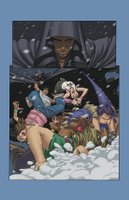 4. Runaways (Brian K. Vaughan/Adrian Alphona & various, Marvel)
4. Runaways (Brian K. Vaughan/Adrian Alphona & various, Marvel)After going on hiatus and then relaunching early this year, the magic could easily have been gone from this book. Thankfully, that hasn't been the case, and, along with Young Avengers and Gravity, this proves that new superhero creations are alive and well at Marvel. The first arc of the new series was a little long, and the sheer joy of newness has worn off a little since the original series, but Vaughan still has his incredible gift for suspense and cliffhangers and an uncanny ear for dialogue. He lovingly uses semi-obscure continuity without wallowing in it, and, since he's working with characters that he created, who don't have a long history in the Marvel universe, he's got a freedom to make drastic changes that people writing long-established characters don't have. Probably the most exhilarating read Marvel publishes.
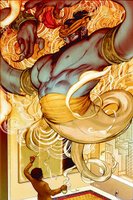 5. Fables (Bill Willingham/Mark Buckingham & various, DC/Vertigo)
5. Fables (Bill Willingham/Mark Buckingham & various, DC/Vertigo)It's amazing to me that Willingham went almost this entire year without appearances by Snow and Bigby, who were the main characters in this book for three years or so, and it was still one of the best and most exciting reads out there. He's put together a cast of dozens and really created an incredibly rich world out of what at first seemed like a silly concept. On top of that, this year he revealed the solution to a mystery that's been in place since the first issue, and not only did it not ruin the book, it gave it a new reason for existing. The revelation was followed by a completely unrelated storyline, demonstrating just how limitless Willingham's world really is. That's not to discount Mark Buckingham, whose detailed and dynamic art is the book's greatest unheralded strength. The guest artists almost always do a good job, too, but Buckingham has really come in and made this book his own. I'm a little concerned about a dilution of the concept with the upcoming Jack of the Fables spin-off, but I think the world here is probably big enough to support two ongoing series.
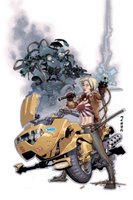 6. Silent Dragon (Andy Diggle/Leinil Yu, DC/Wildstorm)
6. Silent Dragon (Andy Diggle/Leinil Yu, DC/Wildstorm)I found the first issue of this samurai sci-fi series nearly incomprehensible, and might have given up on it if it weren't for Yu's insanely creative and kinetic art. I'm glad I didn't, since the story has unfolded into a great action adventure, combining martial arts, cyberpunk and tongue-in-cheek humor with a twisty plot and the aforementioned top-notch art. Yu has always seemed ill-suited to superhero work, and I think his gritty, inventive linework has found the perfect match in this story. He's designed all sorts of ninjas and robots and ninja robots, and contributed greatly to the sense of excitement in Diggle's fast-paced story. It's a shame he's signed an exclusive with Marvel, meaning that once the last issue of this series is out, we're not likely to see more of it.
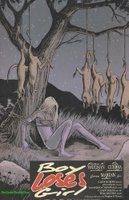 7. Y the Last Man (Brian K. Vaughan/Pia Guerra & various, DC/Vertigo)
7. Y the Last Man (Brian K. Vaughan/Pia Guerra & various, DC/Vertigo)Like Fables, this is a book that has been going for a long time and still finds new ways to open up its rich world to exciting possibilities. It's also a book that started with what on its face seems like a silly concept. Vaughan is the current king of the cliffhanger, and this book is the one where he pulls them out the most often, but the best thing is the way he commits to every insane plot twist and follows it through, sending the story in exciting new directions. Again like Fables, this is a book that answered one of its central mysteries this year and still remained fresh and unpredictable, and there's still so much unexplored potential that I can't imagine it getting stale any time soon.
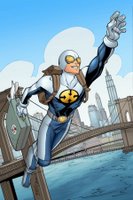 8. Gravity (Sean McKeever/Mike Norton, Marvel)
8. Gravity (Sean McKeever/Mike Norton, Marvel)The best thing that Marvel is doing right now is not the mega-crossover, but these little fun traditional superhero books taking place on the margins of their universe. McKeever puts across a simple, entertaining and intelligent story, using a fairly stock origin story but creating a very well-crafted new character and playing on the history of the Marvel universe to give his tale resonance beyond its own insular events. This is a series that didn't sell well and didn't get much publicity, but if Marvel is going to appeal to a new generation of readers, they need a new generation of heroes, and it starts with books like this (and Young Avengers and Runaways, of course).
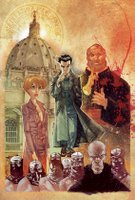 9. Revelations (Paul Jenkins/Humberto Ramos, Dark Horse)
9. Revelations (Paul Jenkins/Humberto Ramos, Dark Horse)I was away from Jenkins's work for a time, and I'm still not sold on much of his superhero work, but this is exactly the kind of thing we should see more of in comics: A good old-fashioned detective story. The religious trappings are only a small part of what's going on in this story, which mixes conspiracies and murders with a very noir-ish protagonist and, of course, a sexy dame for him to bed down with. I don't much care for Ramos's distorted art, which is all wrong for the tone of the story, but so far it hasn't really gotten in the way of what's probably the best thing Jenkins has written since Inhumans.
 10. New Warriors (Zeb Wells/Skottie Young, Marvel)
10. New Warriors (Zeb Wells/Skottie Young, Marvel)And we close again on the theme for this year: Fun, somewhat traditionalist superhero series set on the margins of the Marvel universe. In this case, these are established characters (ones which, I admit, I have a certain soft spot for), but Wells attacks them in a new way while respecting and building on previous continuity, something that many Warriors fans were worried about when this series was first announced. Like Gravity, this series was little-publicized and little-read, but it also deserves a return beyond its six issues, and if we're lucky, it will get one, possibly with a Gravity guest appearance.
No comments:
Post a Comment